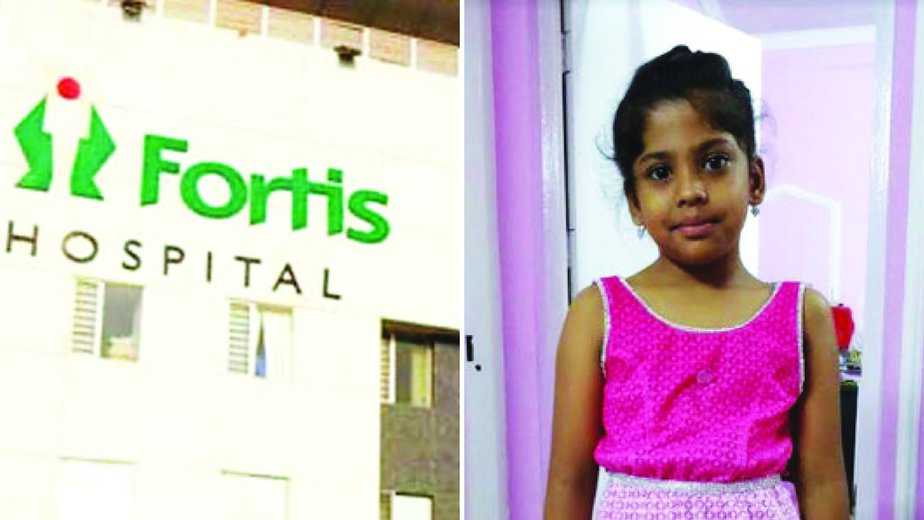Jayant Singh, who was presented a massive bill by Fortis Memorial Research Institute after his daughter died of dengue, has now moved the apex court in hope of justice
A seven-year-old girl dies of dengue shock syndrome. A hospital bill of Rs 16 lakh after a 15-day hospitalisation. The story of deceased Adya Singh, daughter of Gurgaon-based IT professional Jayant Singh, gripped the nation’s attention in November last year.
It all started with a twitter feed on massive overpricing, four months ago, and has culminated into a 311-page writ petition to the Supreme Court (SC). Cases of overpricing and profiteering by private hospitals are way too many, and the cry for creating a regulatory authority to control the way private hospitals price medicines, consumables and treatment equipment has become stronger than ever.
“Disillusionment with the system is immense,” says Singh. “After my first-born’s death, I started a movement on social media against the medical loot. Union Health Minister JP Nadda tweeted saying that the matter will be looked into. An inquiry committee was set up at the state-level, it submitted a report highlighting follies of Fortis Hospital at many levels. This led me to file a First Information Report (FIR) in the police station. The police did not accept my FIR, and filed an FIR given by the state. While my FIR was against the management et al, the police only filed a diluted FIR against the doctor-on-duty,” said Singh.
The Patriot accessed a copy of the petition filed in SC which states, “The Petitioner, before this Hon’ble Court is the bereaved father of his 7-year-old daughter, who died due to gross negligence, gross medical malpractice, and wrong treatment, which resulted in elongation/prolonging medical treatment, which permitted blatant profiteering by the Respondent No. 3 (Fortis Memorial Research Institute) at the cost of his daughter’s life. The Petitioner states that this blatant profiteering is prima facie evident when the Respondent No. 7 pulled out the ventilator support on his daughter, when her survival was deemed economically not feasible.”
An analysis by National Pharmaceutical Pricing Authority (NPPA), the only pro-active government body in the scheme of things, revealed that there was overpricing of from upto 12 per cent to 1737 per cent by the hospital in certain cases while billing the patient. Pharma companies put exorbitant prices on Maximum Retail Price (MRP) labels and offer heavy discounts while supplying products in bulk to the hospital.
While FMRI bought an injection Dotamin for Rs 28.35 from the pharma company, it’s MRP was Rs 287.50 at which it was billed to the patient. In the process, FMRI earned a margin of a mind-boggling 914 per cent from the deal. Many such units of injections were billed to Adya, not just one. Further, a paracetamol injection, Tamin, procured at Rs 36.29, has been billed at Rs 310 (754 per cent margin) to the patient.
Even as NPPA drew a list of hundreds of items which were overpriced, its hands were tied. The outgoing NPPA Chairman Bhupendra Singh had said a few weeks ago, that even as they were drawing up complicated analysis, the regulatory authority could not do much as very few of these drugs came under the Schedule of Drugs Price Control Order (DPCO). While NPPA fines hospitals for overpricing ‘Scheduled’ drugs, the fines in some cases are submitted to the coffers of the government, however, the patient is never reimbursed the massive amount that s/he has spent on buying expensive treatment from private hospitals.
NPPA chairman Bhupendra Singh which has been at the helm to reduce prices of cardiac stents and had initiated a movement to cap prices of consumables like syringes, sterilised tubes, catheters etc, was transferred to National Convention for Chemical Weapons and Warfare pre-maturely. He had a year of his term at NPPA left. Days before his transfer, he had drawn up a list of overpriced drugs in cases of three more private hospitals.
“We fear that Mr Singh’s transfer in total disregard to the public interest is due to pressure from the industry and corporate hospital lobby. The pharmaceutical industry has long sought to undermine and weaken the NPPA in order to enable uninhibited profiteering and circumvention of the law. The recent price revise of coronary stents angered the US-based MNCs which ran a malicious campaign against the regulatory authority. The final precipitating factor, we believe, was the report analysing bills of four patients and which exposed the gross overcharging and misconduct of private hospitals. In this same report, the NPPA appealed for policy intervention to correct the injustice towards patients as it had reached the limits of its mandate,” said Malini Aisola of All India Drug Action Network.
This is precisely the reason why Singh has now moved the SC and is demanding that an effective supervising agency be put in place to look at a multitude of issues. The writ filed by Singh argues, “The Petitioner states that this situation has only been occasioned due to the absence of an effective supervising agency and due to the inadequate protection/safeguards available in the Medical Council of India Act, 1956 to prevent acts of gross medical negligence.”
“Setting profit targets between hospitals, healthcare professionals, diagnostic labs, pharmaceutical companies should be declared as illegal,” said Singh.





